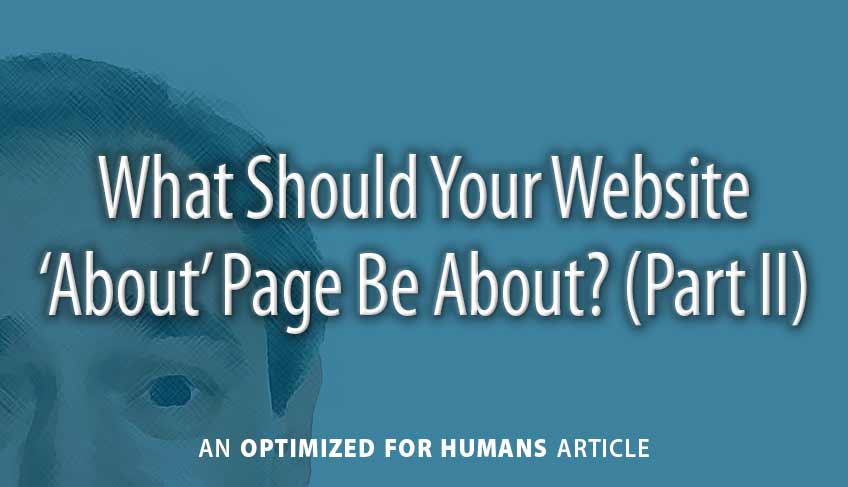
B Y T O M T O R T O R I C I
Have you read part one of this two-part series? You’ll find it here.
Before we continue, let’s talk about what your About page shouldn’t be about: selling your product or service. Visitors click on that About link because they want to know more about you. Too often, though, they land on a page filled with vague, unsupported marketing-speak as company insiders yakety yak about how great they are.
What do online searchers do when they don’t find what they expect? Well, they back out and look elsewhere of course. Yes, there should be what I call a Number Two page that expands on the themes and benefits briefly introduced on your Home page. But that important page should be titled How It Works or Our Approach, not About.
How It Works/Our Approach
Okay, a case can be made for putting this page in the dropdown under the About top-level menu item. But I think it’s important enough to deserve its own place in the main menu. The first purpose here is to explain your unique approach to solving peoples’ needs. Here’s your chance to ‘make a case’ about why you’re a better choice, not just ‘make a claim.’
The second purpose of this page is to show prospective customers what to expect if they decide to work with you. This is far more important than you might think. People are more likely to respond if they know what what’s going to happen after they do. So briefly talk about the process both before and after a commitment.
Good Works
If you or your company have a pet cause or charity, that’s certainly worth mentioning, especially if it aligns with your target market’s own values. Donating staff time, company money, or professional services shows you’re a good community member. While it’s not necessarily the #1 driver of sales, it’s an opportunity to create an emotional connection with like-minded people.
Company Mission, Values and Philosophy
It’s fine to include this, but I’ve seen businesses spend many weeks and many hours of staff time carefully wording a “Mission Statement” that’s really more of an employee-facing affirmation than a customer-facing message.
I’d suggest the company spend that time focusing on their customers’ mission rather than their own. Understand what that online searcher is really trying to accomplish, then align your company’s approach to that. Also, I think that seamlessly weaving ‘shared values’ throughout your site messaging is more effective than making a single, inward-focused statement.
Who We Serve
This is another important one that is often lacking on biz websites. If you serve one or more vertical industries, mention that prominently because those folks want to know you’re familiar with their category. If you serve, say, just purchasing agents throughout various industries, be clear and up front about that too. There are pro’s and con’s to specializing, but that’s a core business decision, not just a website decision.
Another approach is to serve “H.R. managers who are struggling to keep good employees.” Rather than the traditional approach of ‘positioning’ your company, you’re actually ‘positioning’ your prospective clients in a way that makes your offerings a perfect fit.
Client Testimonials
Here’s another one where I think sprinkling brief quotes from happy customers all around your site is going to give them more exposure than stuffing them into a single page. But if you do go the single-page route, don’t title it “Client Testimonials” because that’s an insider’s term. Rather, try “Real Reviews” or “What People Are Saying.”
Another tip here is to zero in on quotes that show you solved a particular problem that a lot of customers out there share. Those are just as important as general accolades that talk about “how great you were to work with.”
Case Studies
These offer the credibility of a job well done, as long as the processes you went through achieved a clear positive outcome. The best case studies are written as a dramatic narrative, introducing a customer problem or conflict that ultimately gets resolved by your team or product, for a nice, happy ending.
The right selection of cases to study shows your capability and flexibility in a range of different scenarios and challenges. Balance that with keeping those cases relevant to the needs, and types, of prospects you most want to attract.
Need help telling your story on your website About pages? Let’s talk about messaging that conveys why you, and your company, are special.
Share It:
 About the Author: Tom Tortorici is an Atlanta copywriter and web content writer who helps companies make a genuine connection with their audience. His classes and conference presentations have focused on how writing, strategy and design can work together to grab attention and interest even among readers with short attention spans. In addition to working directly with businesses, Tom regularly partners with web designers and marketing agencies.
About the Author: Tom Tortorici is an Atlanta copywriter and web content writer who helps companies make a genuine connection with their audience. His classes and conference presentations have focused on how writing, strategy and design can work together to grab attention and interest even among readers with short attention spans. In addition to working directly with businesses, Tom regularly partners with web designers and marketing agencies.
All Posts/Subscribe >
Info for Businesses >
Info for Designers/Agencies >
Tom Tortorici Inc. | Tom@TomTortorici.com | 770-934-7861 | 3101 Rockaway Rd | Atlanta GA 30341
